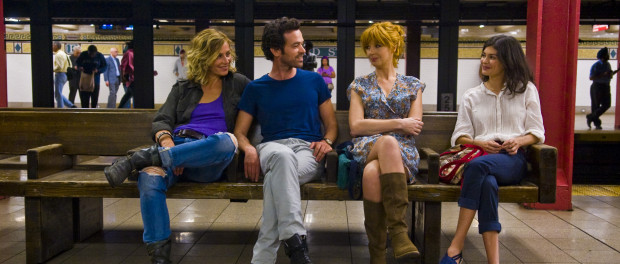Casse-Tête Chinois Takes International Midlife Crisis to New York
Cédric Klapisch is one of those European directors who are not indifferent to the fate of the generations stuck at the crossroads of numerous decades. Just like Julie Delpy with her almost canonical analysis of international love in light of the passing years (“Before Sunrise” (1995), “Before Sunset” (2004) and “Before Midnight” (2013)), Klapisch’s Casse-Tête Chinois seals a story of relationships and dynamics depicting Xavier Rousseau (Romain Duris) with a multitude of women coming his way over many years. Simultaneously, Klapisch immerses the spectator into the events unfolding in picturesque scenery of the world’s greatest cities. This time, the events venture into New York City allowing the contrasting life styles of Europe and the New World to further aggravate Xavier’s midlife existentialist dilemma.
In early parts of the trilogy (“L’Auberge Espagnole” (2002) and “Les poupées russes” (2005)) Xavier managed to amass a respectable amount of personal “baggage” – a few serious loves, an ambiguous writing career, a friendship with a lesbian, and ultimately, a family. His British woman, Wendy (Kelly Reilly), just like Xavier, rejoiced herself in previous parts of the trilogy, but in the beginning of Casse-Tête Chinois gave birth to two wonderful children, alleviated her nine-to-five burden, and fell in love with another man. Then, she grabbed the kids and left for the US, forcing Xavier to engage in a long and hard contemplation and sort out a couple of things in his life.
Xavier, on his end, suffering from a kind of writer’s block, quickly realized that keeping in touch with his kids, now living a few thousand miles away from France, would not be very convenient. Certain in his capacity to conquer the States, Xavier follows his kids and ex-wife.
If the beginning of the film demanded some liveliness, rhythm and intensity while our hero lacked inspiration and had a moral meltdown, well, then his move to New York City quickly corrected the latter. The protagonist finds himself in a maelstrom of overwhelming events. Xavier plunges himself into surrogate fatherhood, a sham marriage and a reunion with his longtime girlfriend Martine (Audrey Tautou). Therefore, the promised “casse-tête”, the puzzle, quickly cottons on.
Remarkably, the two previous Klapisch’s titles of the films were clearly tied to a particular country (L’auberge espagnole, Les poupées russes). This time, America has not been chosen for this honor, as the Big Apple only serves as the backstage for the story. Admittedly, this scenery is drawn with great eloquence and abundant cinematographic taste.
Of course, the greatest victory of the director is the cast who he sustained from his two earlier pieces. He lead the trilogy from point A to Z which wouldn’t have happened without the presence of Romain Duris, Audrey Tautou, Cécile de France and Kelly Riley. And naturally, it wouldn’t have worked without the leads crisscrossing Paris, Barcelona, London, Saint Petersburg and ultimately New York City because each place injects an utterly new sensation to the protagonists’ relationships and bonds.
Casse-Tête Chinois is in theatres now.









